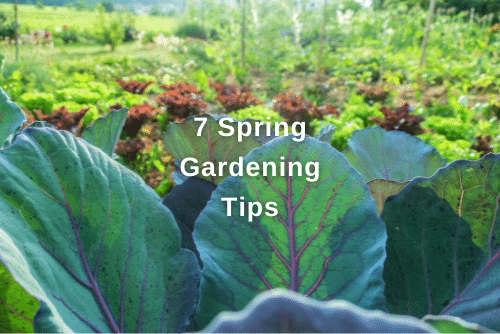1. Don’t Underestimate Your Soil
Soil really has a rich life of its own so pay attention to it and manage it properly. Enrich your soil with organic matter to make sure it can retain moisture and nutrients. You also want to make sure it drains well. You should be able to easily dig, and it should be crumbly and loose so that your plants’ roots have the oxygen they need. When selecting a fertilizer, choose an organic one that adds nitrogen, phosphate, and potash (potassium plants can use). Here’s more info on how to prepare your soil.
2. Mulch Matters
Not only does mulch cut down on the time you spend weeding, but it also reduces your watering needs in the summer and protects the soil. Be sure to lay a thick enough cover, at least 2 inches.
3. Deadhead at the Right Time
If you have spring-blooming bulbs like daffodils and hyacinths, deadhead spent flowers. By doing so, the plants send energy to the bulbs not into making seeds. Now, here’s the part some people fail to do: wait until the foliage turns brown to remove it. If you cut it too soon, the leaves can’t store the nutrients needed for the bulb to bloom next year.
4. Gardening in Zone 8b: Which Fruits and Vegetables to Plant
Ideas for early spring and early summer veggies and greens include beans, cabbage, carrots, chard, kale, lettuce, peas, spinach, strawberries, and tomatoes.
5. Select Plants Pollinators Love
Invite pollinators like bees and hummingbirds into your garden with flowering plants like daylilies, petunias, asters, and phlox.
Plants that grow best in partial or full shade include bleeding hearts, hostas, and coneflowers.
Popular plants that grow well here include hydrangeas, rhododendrons, and lavender.
6. Know the Difference Between Pests and Beneficial Creatures
The Pacific Northwest is known for its rain and that comes with pests like snails and slugs. But other garden creatures are beneficial. Centipedes, millipedes, ladybugs, earthworms, and pillbugs all help your garden so it’s best not to disturb them. For those pesky slugs and snails, be sure to use slug bait. Another one to watch out for: tomato hornworms. They can completely defoliate your tomato plants. Learn about tomato hornworms and how to protect your plants.
7. Get Help From Your Local Nursery’s Experts
Whether you’re new to gardening or a seasoned pro, your local nursery is bound to have the resources and assistance you need when dealing with garden pests, planting a new flower bed, or trying out a new crop. We’re lucky to live in a place with many local experts, including those at Olmsted’s Nursery and Valley Nursery, both right here in Poulsbo. They’re friendly, extremely knowledgeable, and always ready to assist.
 Facebook
Facebook
 X
X
 Pinterest
Pinterest
 Copy Link
Copy Link
